There are dozens of portable power stations on the market. But the problem is how to pick the one that meets your purpose? How do these battery generators compete with each other? Side by side comparison is the answer to these questions. In this post, I will give you an in-depth comparison of Maxoak Bluetti EB150 (1000W/1500WH) and Goal Zero Yeti 1000 (1000W 1045WH).
You can also read my in-depth review of EB150 here. I have been using it for a long time now and it is amazing.
Note: Both Bluetti and Goal Zero are excellent brands. They have wide range of products, great ratings and reliable customer support. Goal Zero products are slightly more expensive than Bluetti.
The exact models I am comparing in this article are as below
| PREVIEW | PRODUCT | |
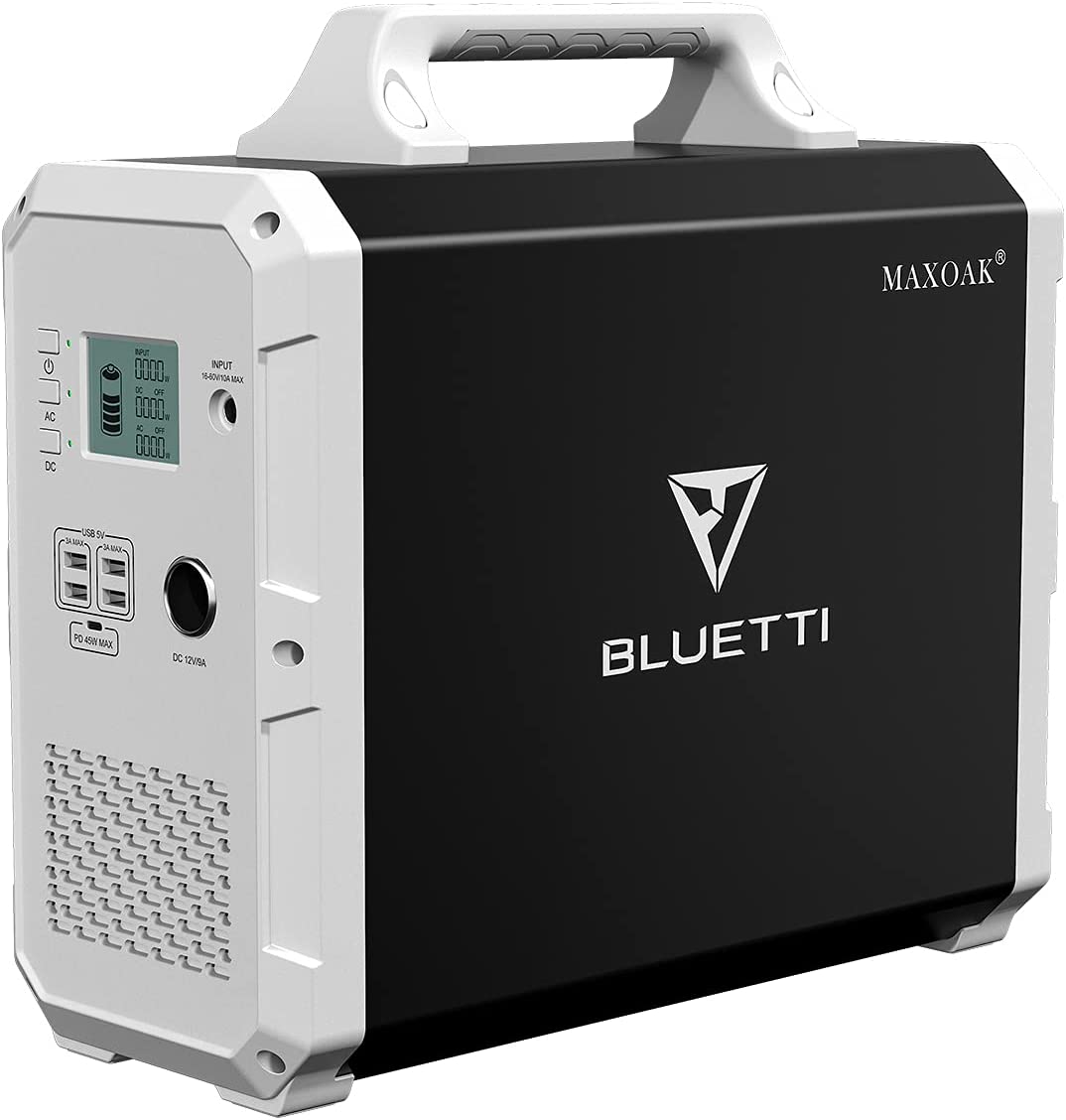
|
Bluetti EB150 | Detailed Info |
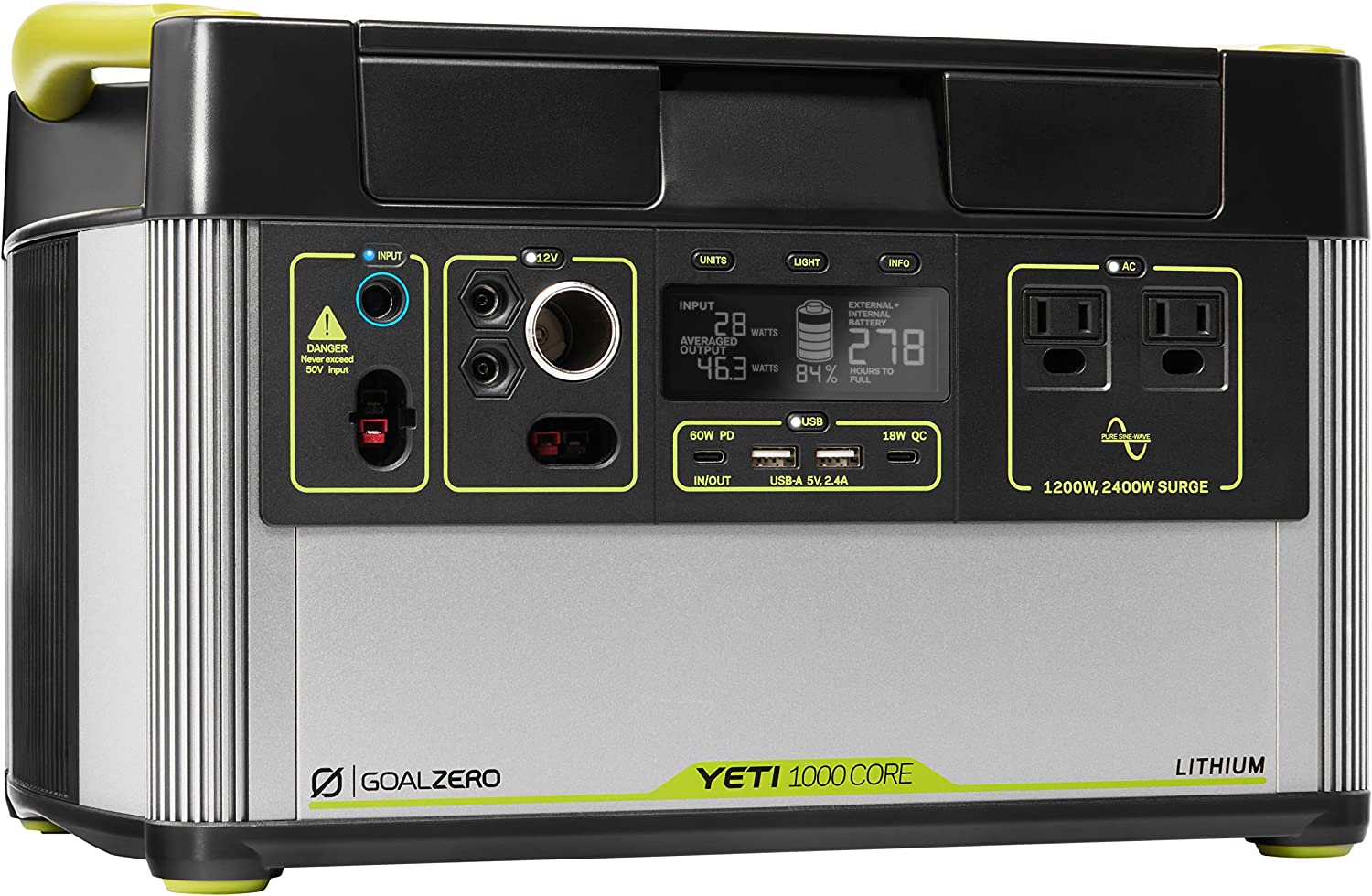
|
Goal Zero Yeti 1000 | Detailed Info |
What’s in the box?
Both Bluetti and Yeti 1000 come in a massive package. My Bluetti station was delivered via FedEx. The following are the box contents.
Bluetti EB150
- PV Solar Charge Cable (7909 to MC4)
- AC Wall Charger (including AC input charging cable)
- EB150 Solar Power Generator
- User Manual
- Warranty Card
- Certificate of Qualification
Goal Zero Yeti 1000
- Yeti 1000 Lithium Power Station
- Wall Charger
- User Manual
- Warranty Card
First Impressions
The aesthetics of power stations shouldn’t matter much as long as it serves the purpose. But since the power stations are quite heavy, it’s better if we have a comfortable handle to carry it around. Bluetti has a single handle whereas Yeti has 2 handles, one each on either side. Bluetti can be carried with one hand while Yeti needs two hands!
Goal Zero weighs 40 lbs whereas Bluetti EB150 weighs around 35 lbs.
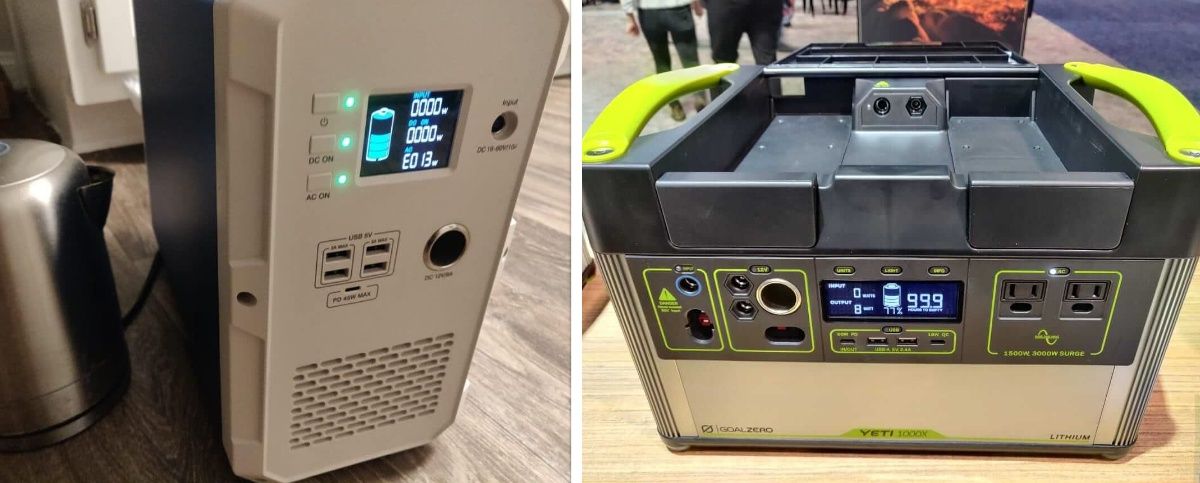
Find the number of ports and their power rating in the below table.
| Yeti 1000 | Bluetti EB150 | |
| AC Power Outlets (110V) | 2 Ports 1500W each | 2 Ports 1000W each |
| USB Ports | 2 Ports 5V | 4 Ports 3A Max |
| USB C Ports | 1 60W PD In/Out, 1 Quick Charge Port(18W) | 1 Port 45W |
| DC Car Port | 12V 10A | 12V 9A |
| Solar/DC Input Port | 14 – 22V | 16 – 60V / 10A |
| Digital Display | Yes | Yes |
| AC On/Off Switch | Yes | Yes |
| DC On/Off Switch | Yes | Yes |
| Overload Protection | Yes | Yes |
Battery Capacity and Power
When you consider a portable generator, both Power and Battery capacity are important in their own terms. But when it comes to choosing one, it completely depends on your applications. If you want to run a power appliance you need more power capacity which is watts. But, if you want to run an appliance for a longer duration battery capacity becomes important i.e watt-hours.
A simple example to make you understand the difference is to consider an appliance of 1500W. Now to run this appliance you need a power station with a power capacity of 1500W or higher.
Suppose you want to run a 250W blender. With a power station with a battery capacity 1000Wh, you can run for 4hrs whereas a 1500Wh power station can run it for 6hrs. (Assuming 100% efficiency)
Basically power capacity is how much power can the power station drive whereas battery capacity is how long the appliance can run.
| Goal Zero Yeti 1000 | Bluetti EB150 | |
| Power | 1500W | 1000W |
| Battery Capacity | 1045Wh | 1500Wh |
| Surge | 3000W | 1000W |
It is pretty simple here. If you need power you lose battery capacity and vice-versa. So it completely depends on what appliance you need to use. If you wish to use a low-power appliance then blindly go for Bluetti.
Charging
Both Bluetti and Yeti support multiple charging methods. Have a look at the below table to have an idea of charging time.
| AC Wall Outlet | ~18 Hours for a full charge | ~10 Hours for a full charge |
| Solar Panel | 2x100W Panel (~8 Hours) | Supports 500W Panel |
| Car | Yes (~14 Hours) | No |
Car charging is super helpful when you are on a trip and Yeti has got this option covered.
But Bluetti charges way faster than Yeti which is also an important feature.
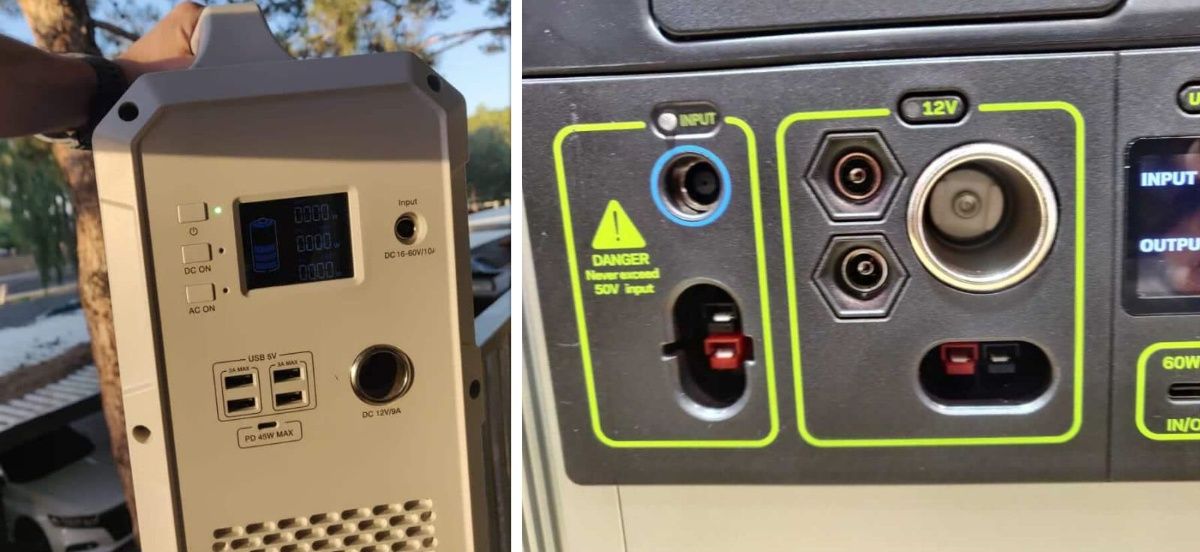
Performance
The following table gives you an idea of EB150 and Yeti 1000 in performance.
| Appliance | Yeti 1000 | Bluetti EB150 |
| Laptop (80W) | 12+ Times | 18+ Times |
| LCD TV (150W) | 7 Hours | 9 Hours |
| Smartphone (8W) | 100+ Times | 175+ Times |
| Desktop Computer (200W) | 5 Hours | 7 Hours |
| Ceiling Fan (52 inch) | 17 hours | 1 Day |
| Microwave Oven (1100W) | 60 Minutes | 90 Minutes |
| Instant Pot Cooker (900W) | 65 Minutes | 100 Minutes |
| Corded Drilling Machine (600W) | 1.7 Hours | 2 Hours |
| Washing Machine (900W) | 70 Minutes | 1.5 Hours |
| Blender (250W) | 4 Hours | 5.5 Hours |
| Electric Clothes Dryer (1700W) | No | No |
| Toaster (650W) | 100 Minutes | 2 Hours |
| Electric Kettle (1300W) | No | No |
| Portable Refrigerator (70W) | 15 Hours | 20 Hours |
| Mini Vacuum Cleaner (250W) | 4 Hours | 5.5 Hours |
| Surveillance/Wifi Camera (5W) | 9 Days | 11 Days |
*Based on efficiency numbers may vary. It is just a rough idea
With Bluetti you can run an appliance for a long duration because of battery capacity. But Yeti has a surge capacity of 3000W that can help you turn on power appliances at least for a short duration.
Yeti 1000 Vs. Bluetti EB150: Which one to consider
Even though both of these battery stations are similar in features, there are some significant differences in technical aspects and pricing. Also, Goal Zero Yeti 1000 is a smart device that lets you control it via your smartphone. This is a cool feature most of the other batteries lack. Consider the following points before buying the products.
Buy Bluetti EB150 If:
- You need more battery capacity (watt-hours)
- You are looking for an affordable generator
- Need to charge faster & easy to carry around
No products found.
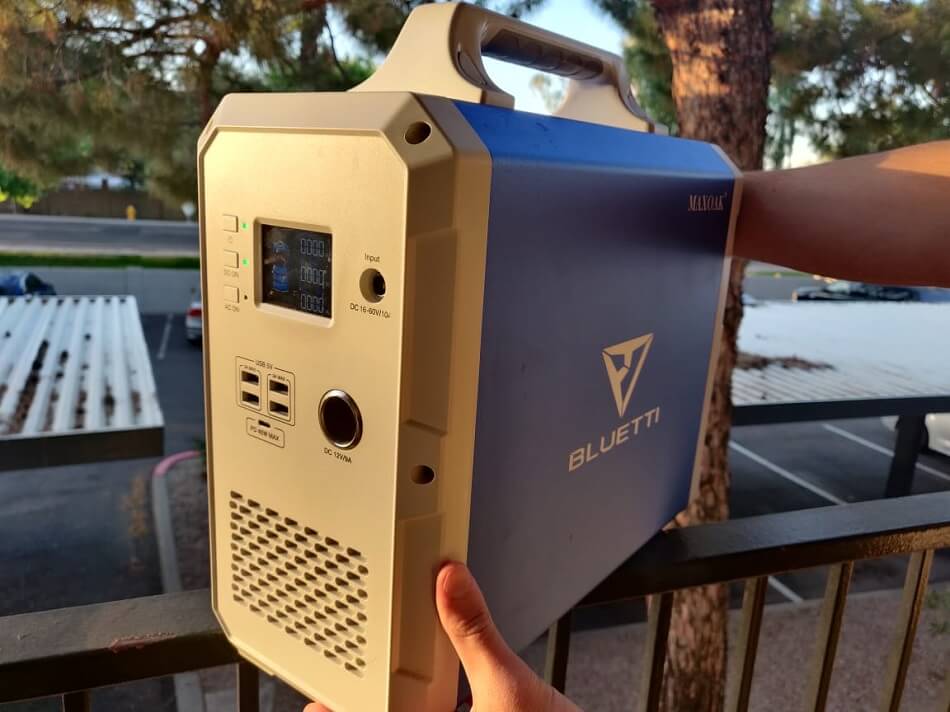
Buy Yeti 1000 If:
- You like to have more surge capacity
- You care about aesthetics and smart connectivity
- MAXIMUM CAPACITY: The 1000 Core powers most small and large appliances...
- VERSATILE AND PORTABLE: Fridges, electric barbecues, e-bikes, and more all...
- RECHARGE WITH SOLAR: Maximize your solar input with Goal Zero's MPPT...
Bluetti EB150 is pretty affordable when compared to many other 1000W power stations
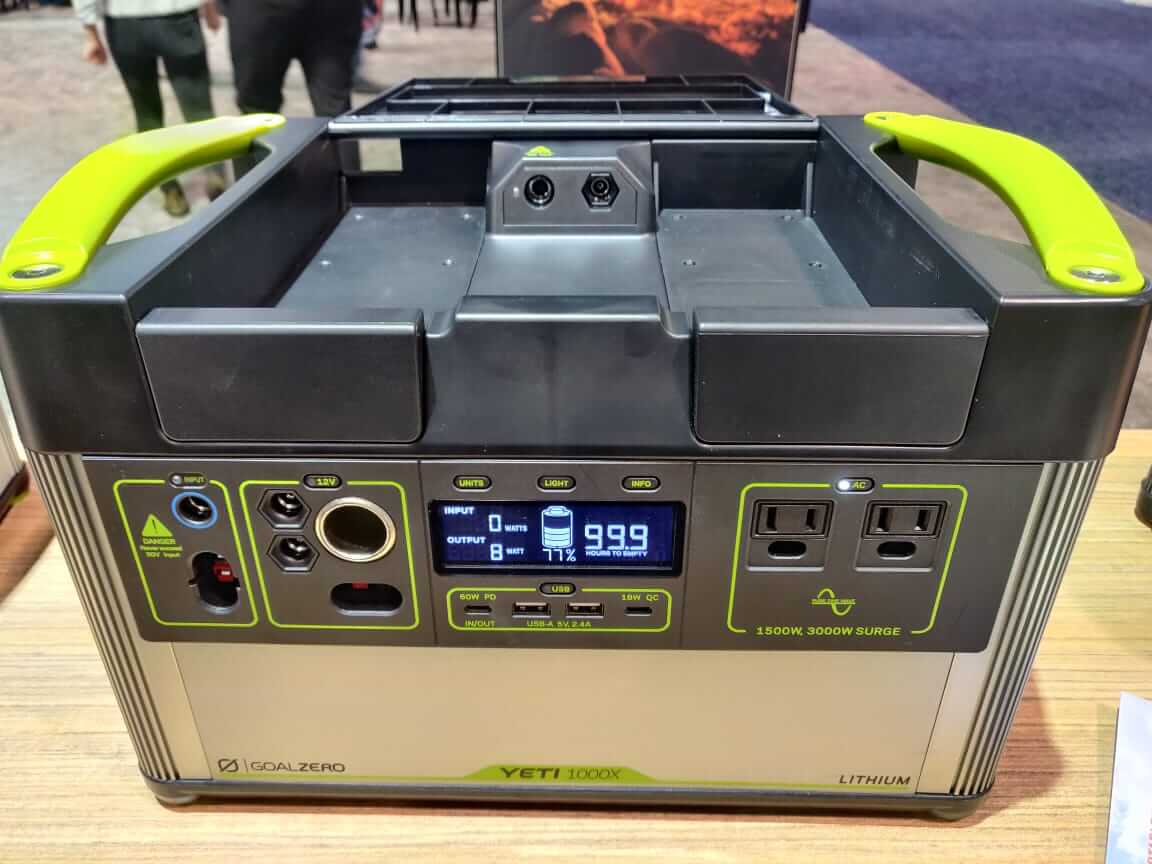
If you have any concerns or questions, do leave a comment and I will be happy to answer them.
Last update on 2024-04-16 / Links / Images from Amazon PAAPI

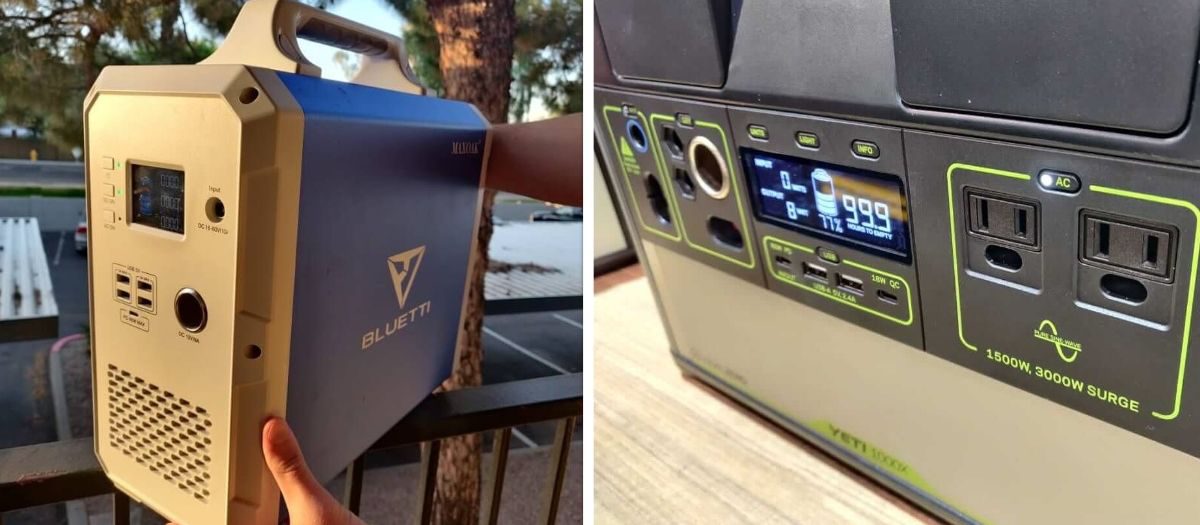
I have a bluetti eb3a that is new, first time using it. Odd that when finished charging it says 100% but if it just sits there over night it will drop to 95%. I’m out camping now and charged 2AA batteries and it pulled it down to 59%, charged my phone Samsung note 20 and it’s down to 29%. Only other item running on it is 100 LED Xmas light string, which doesn’t register on the output. Why do much draw for a couple AA batteries? Yeti 200x is running same string of lights and a hold pump and it’s only at 86%. Not happy so far with the bluetti performance.
Can the batteries be replaced on both generators?
As far as I know, the batteries are actually sealed and cannot be replaced. The battery cycles are very high, so they will last for several years. If you really need to replace the battery, you will have to cut open the power station and do some extra work.